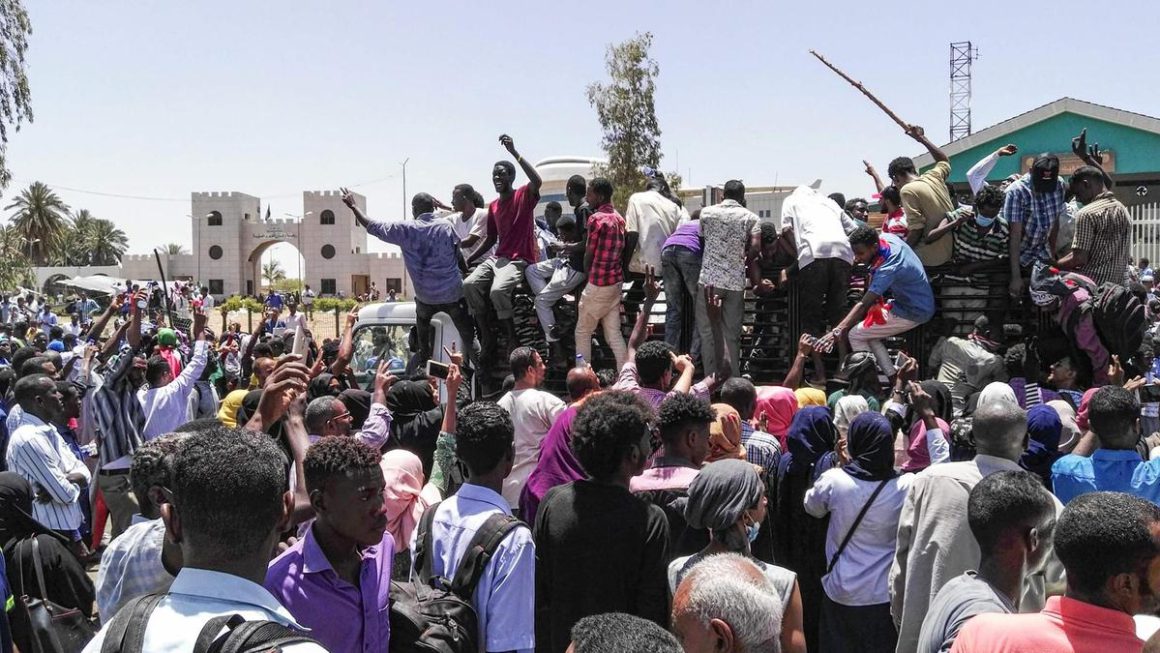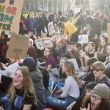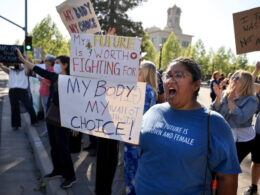By members of Socialist Alternative, sister organisation of Socialist Party in Sudan
Four months of mass struggle on the streets, with a ceaseless flow of demonstrations, strikes, occupations and sit-ins, culminated in the removal from power of dictator Omar al-Bashir one month ago. Since then, a continuing mass sit-in in front of the headquarters of the General Command of the Sudanese Army in Khartoum, and smaller occupations in front of the headquarters of the army in other states, encapsulate the ongoing battle between the living forces of the Sudanese revolution and the ‘Transitional Military Council’ (TMC) which hijacked political power on behalf of the old guard and ruling classes.
Changes in the trade unions
The revolution has conquered a number of gains. The most important of which is the forming, through the struggle, of a unified trade union organization that has brought various professional categories and public sector workers together.
This includes for example the Democratic Lawyers’ Union, which has brought legal support to revolutionaries, and has stood before all the emergency courts that ruled to break the demonstrations, and is now fighting to obtain official recognition of its existence; the Sudanese Central Doctors Committee, which was present during the course of all the protests and is organising the installation of medical clinics in the sit-in, and has also taken upon itself the task of counting the statistics of the dead during the last five months. Other sectors that organized themselves in similar union bodies parallel to and independent from the official unions have rallied together to form what is called the Sudanese Professionals Association (SPA), the main union umbrella that organized many of the protests and also launched the ‘Declaration of Freedom and Change’.
Yet whilst having played a very important part in organizing the demonstrations, the leaders of the SPA do not articulate a clear idea of what should replace the current regime, and oscillate between the pressure of the streets, which want the TMC to go, and their own illusions in a soft landing for the old dictatorial regime and in convincing the generals to strike a compromise.
In addition, there are examples of organizational entities that are fighting to extract the official trade unions from the influence of the former regime, within companies and workplaces. For instance, through the remnants of the union of the Kanana Sugar Company – the largest sugar company in the country, located in the White Nile state -, hundreds of workers have stopped their work and organised a sit-in in front of the Kenana military garrison until their demands against corruption and unfair treatment were met. In a General Assembly of the union, the elements of the official union that were associated with the system’ interests were chased out; the union was restructured in a more democratic manner, and the corrupt director of the personnel of the company, responsible for the redundancy of nearly two thousand workers years ago, was chased out.
Several other sectors of the working class have started taking action like the temporary workers of Port Sudan, the oil workers in West Kordofan, the laboratory technicians in the Red Sea state. These actions are not only to demand radical change in the workers’ conditions, but often also to redress grievances related to the old regime’s repressive policies in the workplaces, such as the reintegration of workers kicked out of their jobs for not supporting the regime, the removal of ‘union’ officials who collaborated with the dictatorship, etc.
Neighborhood Committees
On May 11, a ‘seminar’ about the current political situation in Sudan was held by a neighbourhood committee in one of the districts of Khartoum – an event that could never have happened in the old days, and transpired of a revolutionary feeling. The success of the sit-ins so far has been the product of the continuous grassroots organising work done by this multitude of committees, which have spread around in many towns, cities and villages across the country.
A statement from the SPA weeks ago suggested a change to be brought in these committees’ name, from “Resistance Committees” to “Resistance and Change Committees”, meaning that the committees would be tasked with more than just resistance to the former regime, but also with “change”, i.e. the building of a new state and the construction of its democratic foundations. This does not stop at the definition only, there are examples of committees already involved in running local affairs.
It is important though that these committees are not merely used as an auxiliary appendage to a political arrangement made at the top by the SPA leaders, but are seen as the core basis for the masses to organise and transform society from the bottom up, and impose their own revolutionary will. For this process of committee-building to take its full meaning, Socialist Alternative Sudan defends that they should function on the basis of systematic election of delegates and their right to recall, and should also extend their network up to and including in the workplaces, in the state administration, in the big agricultural estates, etc. Coordinated at every level, they can form the basis for an independent revolutionary government made up of representatives of the workers and poor masses, that could sweep the current regime once and for all.
The discredit of islamization policies
Bashir’s regime had weaponised religious discourse in Sudan, exploiting emotions of the predominantly Muslim population for personal and partisan interests, having nothing in common with people’s beliefs. A number of religious leaders were given the task of calming the recent street protests. However, within the community they were constantly challenged and pushed back by ordinary people, and all attempts by the elders to whip up religious passion were thwarted and exposed. Many of the sheikhs were expelled from the mosques because of their support for the regime or their attempts to demonize the revolutionary movement. The former regime, its figures and its symbols, after the revolution, are being targeted repeatedly by citizens in markets and public places.
Since its accession to power in 1989, the previous regime had also pursued a policy called “stabilization” consisting in exploiting the public institutions for its own interests by recruiting and promoting all those belonging to the Islamic Movement. In return, all employees who weren’t part of the Islamic Movement were taken away from the institutions and put on pension. In this way all public institutions were purged and brought under the regime’s control.
Yet in the last period voices have mounted to demand the systematic removal from all the institutions and public companies of all those implicated with the old regime – in the understanding that maintaining them in their positions would allow the counter-revolution, after rearranging its ranks, to cause chaos in the state.
Political appeasement by the Sudanese elite
Since independence, history has witnessed the abortions of several revolutionary uprisings that have taken place in Sudan. The capitalist ruling elites have cooperated with the military to turn on any democratic and social change and to put their profits and interests above and at the expense of the interests of any genuine development, because of their distance from the street and from the needs of working people and the poor. The same scenario is currently shown not only by the urges of the Military Council to keep power in its hands, but also by the disposition of the leaders of the opposition alliance, the ‘Forces for Freedom and Change’, to make concessions to it and work out a deal from the top that would put an end to the revolutionary struggle from below.
Since the first coup on the morning of April 11 up until now, the question of handing power over to a civilian government has not been resolved, because of the limitation in the political program and strategy of the negotiating committee, and its lack of confidence in the movement on the streets – and the continued submission, prevarications and concessions by the Forces for Freedom and Change, which have provoked a number of differences within this alliance’s ranks.
While the military council tries to delay and gain time to prolong its hold on power, and to engage in a number of other manoeuvres (such as sitting with the parties and other political forces that were part of the previous government until the fall of the regime, the “government of reconciliation”), the Forces for Freedom and Change continue to sit with the military council to try and negotiate a power-sharing arrangement, which increases confusion in the movement and gives more time to the former regime and its cadres to rearrange its ranks, and to continue hitting at the cohesion of the street. On May 14, the military usurpers announced an agreement with the opposition for a three-year transition period to a civilian administration. Meanwhile, forces on the same side as those with whom the SPA leaders were negotiating were shooting live ammunition in the streets, taking the lives of over 10 protesters on the 14 and 15 May. This shows that this arrangement is a rotten compromise and a new manoeuvre from the old military guard to keep power and break the movement down the line; it should be rejected outright. In any event, a “civilian government”, if ever it sees the light of day, wouln’t offer any salvation for the millions of Sudanese poor, workers, women and youth fighting for revolutionary change – unless it were to break decisively with capitalism, a system based on the extortion and exploitation of the majority of the people by a small minority running the economy for their own benefits. This is why it is important to build an independent mass workers and youth organisation that will stand firm in opposition to capitulating to any arrangements with pro-capitalist forces. We support free and democratic elections, but achieving all democratic demands of the revolution cannot be realised in a capitalist framework. We call on the formation of a revolutionary constituent assembly, elected from all section of the society, to plan the future of the Sudan.
The head of the military council talks about “completing the uprising and the blessed revolution”. But these people have no mandate nor legitimacy whatsoever to speak on behalf of the revolution, which they have opposed with all their might.
The removal of Bashir did not happen through negotiations, but through the irresistible power of mass action. That is why Socialist Alternative Sudan demands the immediate suspension of the negotiations with the military council, and argues for the continuation of the revolution with the aim of the masses themselves taking control. Negotiations with the military council will delay this process and eventually kill it. Hence we stand in opposition to making any deal with the military council. Instead, the SPA should call for a renewed campaign of mass civil disobedience, including generalised strike actions, to get rid of the military junta once and for all.
Only ten days after Bashir’ s overthrow, in the face of the intransigence of the military council, and with the negotiations between the parties reaching a dead-end, the forces of ‘Freedom and Change’ had came back to the land of the sit-in and announced they had suspended any negotiation with the military council.
The subsequent arrival of a large convoy carrying thousands of revolutionaries cutting hundreds of kilometers from Atbara – the first city that ignited the fire of the revolution in December of last year- up to the site of the sit-in in the capital, had brought the momentum back in the camp of the revolution. The military council was forced to make a step back, and even came out with a press statement admitting that the forces of the SPA were the only force representing the street! On May 2, hundreds of thousands of people demonstrated again to demand the military council to step down. But instead of using this momentum to escalate the movement, the leaders of the opposition took fright, and run back to negotiating with the main representatives of the counter-revolution.
Military ambitions, and the ‘deep state’
The Rapid Support Forces, the newly joined forces of the army who have a dark history, took advantage of their newly acquired position from the coup in order to impose their power and seize all companies which were owned by parts of the former regime.
The newspapers have talked a great deal about putting the private companies of the former regime in the hands of the army, supposedly as an attempt to recover the looted funds from the country. Will these companies be included in the state treasury or will they eventually be acquired by the Rapid Support Forces? We could witness in Khartoum a scenario similar to what happened with Sisi’s army in Egypt, with big chunks of the economy moving from the hands of former regime tycoons to the tops of the army, hence from one clique of pro-capitalist gangsters to another – and the situation of misery and mass unemployment remaining virtually the same for the people on the ground.
To avoid this, Socialist Alternative Sudan defends that all the assets, companies and funds previously owned by regime crooks should be open to public scrutiny, immediately nationalised and democratically managed by elected committees of workers and the revolutionary people. Such measures should be enlarged to all properties and companies that threaten of closure, redundancy or relocation, and be seen as the ‘first salvos’ to bring down capitalism in Sudan, and implement radical socialist measures to address the plight of the masses.
It is important to also mention here that the army is now divided into at least two factions: the army with all its official forces, and then the Rapid Support Forces under the leadership of Hamidi, a military faction closer to a tribal force than to a national army, responsible for committing various crimes in Darfur. It begun as a tribal militia, supported by the previous government with weapons and funds to fight for the war in Darfur. This militia benefited from the war and the money paid to it to expand its strength, and has also a large economic source of income, starting with a goldmine taken by force (or through a deal with the former regime – it is not clear) as well as generous financing from the Gulf States to participate in the war in Yemen. To this must be added the European Union funds that are paid directly to these forces, outside of the state treasury, to stop migrants on the border. In the last few days a number of scenarios have hinted at the real counter-revolutionary activities of the ‘deep state’: water and electricity supply have been cut off for long periods, and although ‘support’ has arrived from the Gulf states, there has been fuel shortage with day-long queues. The Sudanese TV channel, the national channel, has broadcasted all sorts of rumours’ and fake news against the sit-in, even after the coup. The violence and shootings unleashed on protesters at the sit-in in Khartoum in the last few nights, which resulted in scores of dead and injured, is also largely seen as the action of shadow battalions made up of supporters of the ousted regime. This proves that the war with the former regime is still raging and that the counter-revolution is at the peak of its ignition.
Socialist Alternative Sudan calls on the need for the workers and the revolutionary masses, through their committees, to undertake the systematic disbanding and disarming of all the reactionary militias, organise the defense of the movement and the protection and security of the neighbourhoods. We also call on the ranks of the army who sympathise with the movement to elect their own committees and link up with workers’ and neighbourhood committees. They should get rid of the corrupt and reactionary officers and join force with the revolutionary struggle.
Regional interests
At a time when the newspapers of the imperialist countries were blurring the picture of the real situation on the ground, as if the revolution was successful and over, the scenario of theft was woven from behind, through the military junta, a counterrevolution supported by the imperialist countries and their Gulf allies in the region, in addition to the so-called deep state, all of these forces sharing a common interest in defeating the revolution. Some of the information came out that the deputy head of national security had visited Egypt a few days before the coup in a secret visit, consulting Gulf leaders to plan the process of isolating Bashir – which clearly illustrates the relationship of neighboring countries such as Saudi Arabia and the United Arab Emirates, through Egypt in this case. Taha Osman, Sudan’s ex-vice President, fled from Sudan to Saudi Arabia after having exposed his attempt to overthrow Bashir with the support of the Saudi and Emirati regimes.
In addition to the unbalanced foreign policy of Bashir’s regime, its support for terrorism and its alliances based on short-term political interests, it is Sudan’s geopolitical status as an entry point into Africa and its relations with Arab countries that prompted many regional countries to intervene in the process of regime change.
From the first days of the coup, the Saudi and Emirati regimes offered military support in order to preserve the survival of the military junta in power. They were expecting that in the bargain the interests of Saudi Arabia and the UAE in Yemen would be protected through the maintenance of Sudanese military forces fighting there. This is in sharp contrast with the demands of revolutionaries and activists on the streets, who wanted the troops in Yemen to return immediately, and this to be one of the first steps undertaken by a new, post-Bashir government.
However, with the narrow margin for the military council to continue to govern unchallenged, navigating through street pressures and international pressure – as the African Union gave only two weeks to the TMC to transfer power to a civilian government – Saudi Arabia and the UAE exploited their influence through Egypt. This has increased the anger of the street and fully revealed the interests of these countries, embedded with those of the Military Council. Protesters carried out two vigils in front of the Egyptian embassy to express the total rejection of the Egyptian interference in Sudanese affairs.
Socialist Alternative Sudan opposes any form of imperialist and regional meddling in the revolutionary process that is taking place in Sudan. We support an end to the barbaric war in Yemen, stands in solidarity with workers and oppressed peoples’ struggles globally, and appeals for all workers and youth in the region and internationally to support the ongoing Sudanese revolution, and to fight for a democratic and socialist world.












